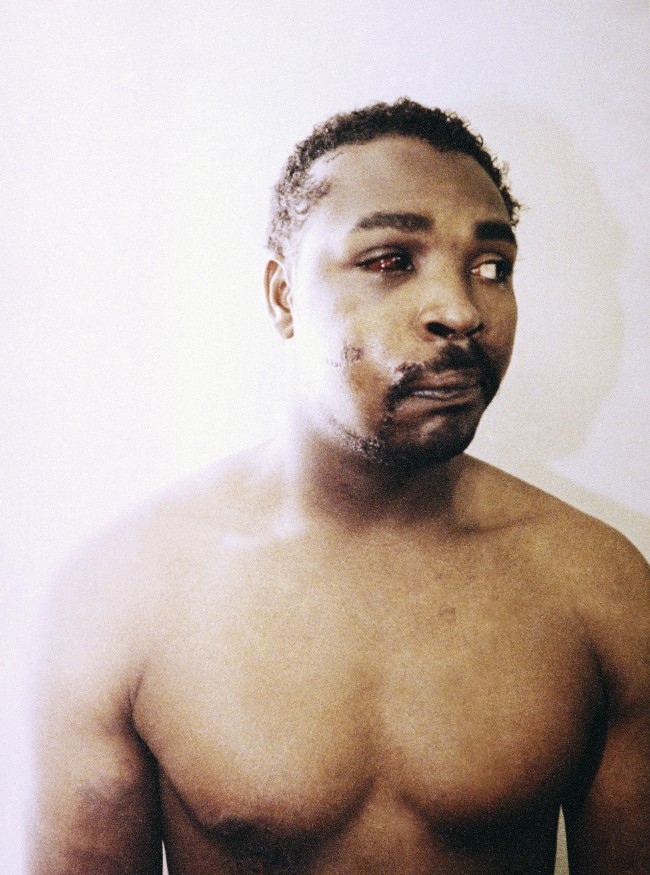Police Brutality: Music Against Cops

FILE – This file photo of Rodney King was taken three days after his videotaped beating in Los Angeles on March 6, 1991. King, the black motorist whose 1991 videotaped beating by Los Angeles police officers was the touchstone for one of the most destructive race riots in the nation’s history, has died, his publicist said Sunday, June 17, 2012. He was 47. (AP Photo/Pool, File)
ANOTHER young black man has been killed by the police in America and there’s the all too familiar narrative to it all.
Vigils, pleas to be heard and unrest has ensued after Michael Brown was shot dead by a police officer in Ferguson. Eye-witnesses have likened the killing to an execution and the policeman in question has been put on paid leave while officials investigate.
Of course, the list of people killed in controversial circumstances by US police forces is depressingly long and, of course, pop-culture has tracked and chronicled what’s happened.
With that, let us listen to some of the most effective tracks about police brutality – some famous, some less so, and spare a thought for those who have been affected by the state killing their children.
Public Enemy ‘911 Is A Joke’
Public Enemy are the most successful group to align politics and music together. In ‘911 Is A Joke’, they expertly detail just how they the can’t trust law and order in America. A lot of things said by PE, even though the message is 20+ years old, are still appallingly true.
Hip Hop For Respect ‘A Tree Never Grown’
In February 1999, 23-year-old Guinean immigrant Amadou Diallo was shot to death by four NYPD police officers after the wallet he withdrew from his jacket was mistaken for a gun. The officers involved were acquitted. A veritable supergroup of black musicians (including Mos Def and Talib Kweli) got together for ‘Hip Hop For Respect’, and in blue-collar rock, Bruce Springsteen recorded American Skins (41 Shots) for the same cause.
Black Flag ‘Police Story’
Black Flag have always had a problem with the police and in ’81, the hit out at the authorities with this one-inch-punch of noise.
NWA ‘Fuck Tha Police’
NWA were never going to shy away from taking on the long arm of the law. The song foresaw the mass resentment towards the police that later exploded in the LA Riots in 1992 after the death of Rodney King. NWA even alleged that black people in the police were worse than the whites: “Don’t let it be a black and a white one ’cause they’ll slam ya down to the street top – black police showing out for the white cop”
Dave Goodman & Friends ‘Justifiable Homicide’
Dave Goodman was the sound man for the Sex Pistols’ earliest recordings. However, Goodman put together a band and released ‘Justifiable Homicide’, which protested against the killing of 39-year-old Liddle Towers by British police. After arrest, Towers spent a night in jail where he was brutalised by police to the point where his injuries killed him. An inquest into the incident determined Towers’ death as “justifiable homicide.”
Bodycount ‘Cop Killer’
Ice T’s ‘Bodycount’ did not mince their feelings about the police. Looking at police brutality, Ice T tells a story of someone who can take it no more, and does something themselves. President Bush, Tipper Gore and Dan Quayle were unsurprisingly horrified at the song.
The Hates ‘LA Riots’
The Hates said of their song: “I wrote “L.A. Riot” after the Rodney King debacle and the resulting aftermath. It seemed incredible to me at the time that police brutality could even exist. We as people are supposed to be better than that. Even more incredible was the police trial. Justice seemed blind and it felt as if we had no power against a group who are supposed to protect and serve but end up using their authority to take their frustrations out on others. The riots after the police trial made me feel like we were all living in a Mad Max world.”
Posted: 12th, August 2014 | In: Music Comment | TrackBack | Permalink


